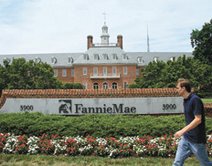Would John Stewart Mills or Adam Smith have done what George Bush did?

Just imagine for a moment that Adam Smith or John Steward Mills, the forefathers of free enterprize economics, should wiggle in their graves, stretch, leave their tombs and glance at the morning paper, say, in Washington D.C.
"Hey! What’s going on!" you can hear Adam exclaim in dismay, "I thought those guys in Washington were conservative economists...but what’s this about the Federal government dishing out $200 billion to keep Fannie Mae and Freddie Mac from going under? " Smith would inquire.
The basic notion of free market economics, so in fashion these days, is to cut down government interference in economic processes to an absolute minimum and stimulate competitive conditions among producers. True, when Mr. Mills wrote his thesis the world did not have mega-corporations, nor staggering monopolies, nor globalized banks and financial institutions; capitalism was just a raudy teenager shouldering its way out of the remains of the mercantilistic system.
Are we facing the entrance on the scene of a sort of State capitalism--the kind free market pundits have belittled for so long? With George Bush’s approval, Treasury Secretary Henry Paulson has once again broken the rules of conservative economic dogma. And, coincidence or not, the move to save Freddie and Fanny comes when the political scene in the U.S. is warming up, and when the state of the economy is one of the main concerns of voters.
Not to make comparisons, but regimes such as that of Benito Mussolini and Germany by Adolf Hitler ushered in their own particular forms of state capitalism, with the political coverage of fascism: in both cases the declared aim was to bring about a significant increase in prosperity, however repugnant their other teachings and practices. They did so among other reasons to shore up undisguised economic slumps eating away at Italy and Germany. They resorted to state capitalism also to enhance the pasting together of a supposed "union" between capital and labor, sealed together with flag waving nationalism, war mongering and ethinic genocide. On the other side of the ideological fence, Stalin developed a sort of bureaucratic State capitalism in substitution of socialist means of production, and ended up likewise in edifying a profoundly repressive system.
The bailing out of Fannie and Freddie is by no means the only case of government intervention on behalf of staggering or mismanaged business enterprizes in the United States, but it is probably the biggest and involves an essential ingredient of the economy: housing. Having a house is part and parcel of the "American Dream" but in order to make that dream come true an array of easy credit and mortgage arrangements appeared on the scene...until buyers realized that they would have to pay through their teeth or loose they newly bought home.
We might mention just a few other recent well-known cases of government inspired bail outs: the Lockheed Aircraft Corporation, Penn Railroad, Chrysler, the propping up of savings and loan associations in the 1980’s, the $15 billion subsidy Congress approved for airline companies in the wake of September 11th...
Is it "right" or "wrong" for the State to intervene in favor of private businesses that get into difficulties? That obviously depends on one’s economic and political views. What is clear, however, is that political and economic conservatives are publically opposed to the intervention of the State. Their view in fact is that the role of the central government should be reduced to a minimum expression. Nevertheless, under the Bush Administration--clearly conservative economically, politically and socially--certain areas of government activity have increased enormously: defense, internal security...Big business has received tantalizing tax reductions, the State has stacked up record deficits--even having to go abroad to get loans to pay them off.
The crash in 1929 appeared at a time when conservatives were also opposed to market controls...and it led to the New Deal policies which injected enormous amounts of money into the economy to deal with wide spread unemployment and economic depression. The result appears to be that the policy of "non-regulation" inevitably ends up in State intervention to shore up the economic or private business exercising an enormous influence over the economy.
P.S. What did the grandaddies of free market capitalism (Adam Smith, Ricardo, John Stewart Mills) say about this? Well, they were not exactly receptive to the State saving the neck of private businesses plagued with mismanagement. According to Smith State intervention would but distort economic growth and hinder social equality.
0 comentarios